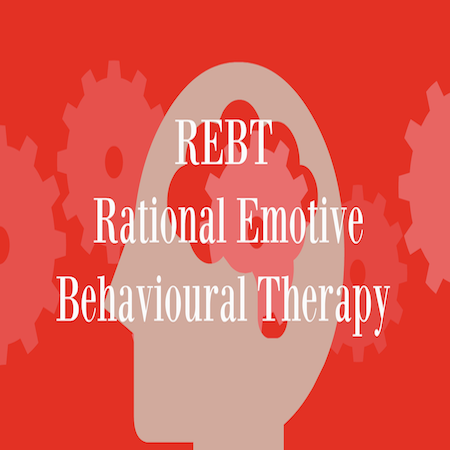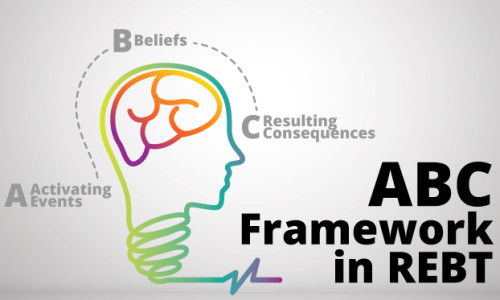Curious about Rational Emotive Behavior Therapy? Want to know how this helps with depression, including irrational beliefs, negative emotions, and psychological distress?

Read this article for more info on (REBT). This form of therapy that focuses on using a therapeutic tool to establish core principles for improving overall mental health is effective according to a vast majority of people who have tried it.
Reduces Anxiety And Change Unhealthy Beliefs That Motivates People To Foster Positive Effects
REBT sessions push people who are feeling depressed to reduce anxiety and change irrational beliefs that contribute to their psychological problems. They motivate them to foster positive effects.
A Form Of Cognitive Behavior Therapy
Wouldn’t you know – Rational Emotive Behavior Therapy (REBT) practitioners use their techniques to overcome various issues, even job-related stress? Even as professionals, REBT therapists practice what they preach. The reason for that is the treatment is beneficial for turning negative thoughts and unhealthy emotions into positive emotive behavior or emotional responses. So instead of self-destructing, the person can be successful and accomplished, with high self-esteem and no longer experiencing mental health issues.
Find Solutions To Produce Positive Results
Rational Emotive Behavior Therapy (REBT) is a type of treatment program that attempts to find solutions to produce positive results. Why? The belief of rational emotive therapy is simple – people think and feel so much because of their particular underlying beliefs. So if they feel wrong, they will also react with negative emotions or present with a negative behavioral response. How they manage their feelings and thoughts is innate and not from external conditions.
It is a form of cognitive-behavioral therapy that focuses on identifying and changing behavior or common irrational beliefs. Rational Emotive Behavior Therapy (REBT) is one of the most commonly used therapies for treating mental health disorders, and research suggests it can be beneficial for treating a wide range of conditions. REBT for anxiety, depression, and substance abuse is helpful. Rational Emotive Behavior Therapy (REBT) techniques focus on helping individuals identify and challenge their irrational beliefs, and replace them with more rational thought patterns. While REBT is not a substitute for professional medical advice, it may be an effective tool for coping with mental health disorders. Peer-reviewed studies prove just how beneficial REBT is.
Sometimes the person will think irrationally and have beliefs that are illogical. We put ourselves out there and undergo more emotional distress like rage, disgrace, and anxiety.
REBT is based on the premise that we are perfectly competent individuals who are capable of leading happy and fulfilling lives. The REBT model explains that our emotions are not caused by events, other helpful reports, or circumstances outside of our control, but rather by the way we choose to think about those events. REBT is typically conducted through casual conversation between the rational emotive behavior therapist and client and sessions involve learning ways to increase personal and job satisfaction.
“Anxiety can direct you to see that something about a situation is too important to ignore. An REBT therapist can help you learn how to give a situation attention without it needing to be anxious attention.” –Kristine Tye, MA, LMFT

A doctor named Albert Ellis formulated REBT in the 1950s when it was originally called rational therapy. Albert Ellis also designed this program with an ABC Model in mind.
A stands for Activating Situation; the activating event wherein the person feels self-destructive or when he feels and acts negatively. His low self-esteem and irrational thoughts negatively affect him and his mental health.
B stands for Beliefs (irrational and rational beliefs); when the person thinks about the Activating Situation (activating event) and has formulated his own Beliefs about it.
C stands for Consequences; it is the negative reaction to such overwhelming feelings or the outcome of such negative feelings. Some blame external events for the consequences that they experience.
In the ordinary sense, many believe that A can lead to C directly. For example:
“Singing in front of a large crowd makes me feel anxious and self-defeating.”
(“Singing in front of a large crowd” is A and “makes me feel anxious” is C.)
Now, if rational emotive behavior therapy is about the ABC Model, then, in the example above – where is B? Why is the example only exhibiting A and C? That’s because people attribute the particular event (activating event) directly to how they feel or act (consequences to the negative beliefs). The skip on B is the “pushing factor” for everything.
Rational Emotive Behavior Therapy Mental Health Benefits
REBT is a type of therapy that helps people to identify and change their irrational thoughts and beliefs. This action-oriented approach is based on the belief that it is our thoughts and beliefs that cause our emotions and behaviors, not the people or events in our lives.
Beneficial REBT is one of the most effective forms of therapy for treating depression, anxiety, and other mental health disorders. It has been shown to be especially beneficial for those who seek treatment early on.
While traditional forms of therapy can often take years to conclude, group REBT is typically only needed for a few months. This is because REBT is focused on helping people to change their thinking patterns, rather than simply providing support and guidance.
One of the most important aspects of REBT is that it helps people to identify and challenge their rigid expectations. These are the unrealistic beliefs that we hold about ourselves, other people, and the world around us. When these expectations are not met, we often feel disappointed, frustrated, or even angry.
Share Experiences And Learn From Each Other
REBT allows people to share their experiences and learn from each other. This also provides an opportunity for people to practice the skills they are learning in a safe and supportive environment. Just like in the past, REBT concluded with affirmations.
Going back, why is the person anxious? The typical answer is because of him singing in front of a large crowd. But why? What made him think or feel that he is anxious when singing in front of a large group? Karin Draper, LMFT explains, “In the lives of those experiencing anxiety, anxiety has almost always served a purpose as a survival function at some point. ”
The person is anxious because he thinks that he will choke while singing in front of a large crowd. That’s the real truth behind it. The person BELIEVES that he will fail that’s why he is anxious. The underlying beliefs and low frustration tolerance has led the person to have more distressing emotions.
He has not done it yet and still, he BELIEVES that he will fail in front of a large crowd while singing. The belief in failing makes him anxious, and not the act of singing in front of a large group.
Is it an irrational belief? Yes, of course! An idea or a belief is something that the person thinks and feels – it is compelling. How can one believe that he will fail if he hasn’t tried it yet? In REBT, the therapist helps you decrease irrational beliefs or at least in reducing irrational beliefs and avoid self-judgment and promote unconditional self-acceptance.

REBT Is A Generally Accepted Type Of Cognitive Therapy
Dr. Albert Ellis mentions that the person has set up demands upon himself, other people, and everything around him. For some:
-
- I have to perform at my best and get the approval of people, or else I am nothing. I am insignificant.
-
- People within my space have to act a certain way and treat me like how I want to be treated or else – if they don’t do that, I will despise them, and expect punishment for them.
-
- I have to get what I want when I want it, and the world owes me that.
How do people overcome these irrational beliefs?
So, yes! There is a D and an E after ABC for this treatment, and it focuses on helping people turn their disputing irrational beliefs into positive viewpoints.
A – What Activating Situation or activating event prompted this response?
C – What is the Consequence or emotional response?
B – Why are you doing this to yourself? What are your Beliefs? Demands?
D – If your belief is correct, then, what is your evidence of such? Is there proof of the matter? Moreover, is it true?
E – How will you feel better again? What is your preference, and not a need, just to be OK?
With this, a person will learn to cope with and manage his anxiety and other mental health conditions. And so, with the assistance of a licensed mental health professional, a person can overcome his anxiety with the ABCDE Model of REBT. “Believing otherwise is simply a mental trap aimed at avoidance that fails every time. Knowing you can handle your anxiety is the key to taking back control. Taking control of how we think about anxiety provides the ballast we need to weather the storm of anxiety.” Alicia H. Clark, PsyD said.
The core concept of REBT is that our thoughts and beliefs about events in our lives play a large role in shaping how we feel emotionally. By reducing symptoms of anxiety and depression, REBT can help people to better cope with stressors in their lives. Additionally, REBT teaches people new ways of thinking about and responding to stressful situations, which can lead to different behaviors. While there are many local therapists who practice REBT, it is also possible to find online resources and self-help materials.
Some research has shown that REBT can be helpful in improving athletic school performance. However, it is important to keep in mind that REBT is a passive process and that people must be willing to put in the work in order to see results. Additionally, because REBT challenges long-held beliefs, it can be difficult for some people to accept at first.
Rational Emotive Behavior Therapy FAQs
How Does Rational Emotive Behavior Therapy Work?
Rational Emotive Behavior Therapy (REBT) is a structured approach focused on improving emotional well-being by transforming irrational beliefs and thought patterns. It involves identifying and disputing these beliefs and replacing them with more rational ones through cognitive restructuring. This process results in enhanced emotional responses and healthier behaviors. REBT often incorporates skill-building and homework assignments, providing a holistic method for addressing psychological issues.
What is an example of REBT?
What are the three core beliefs of REBT?
What is the main goal of REBT?
The primary goal of Rational Emotive Behavior Therapy (REBT), guided by a trained therapist, is to empower individuals to attain emotional well-being and improve mental health by transforming their irrational beliefs and irrational thoughts. By identifying, challenging, and replacing these irrational beliefs and thoughts with rational ones, with the guidance of a therapist, REBT seeks to reduce negative emotions, enhance emotional resilience, and foster healthier behaviors. This structured and goal-oriented therapy equips individuals, with the support of their therapist, with the tools to manage life’s challenges, prevent relapse into irrational thinking, and lead more fulfilling lives.
What is the difference between cognitive behavioral therapy and REBT?
Cognitive Behavioral Therapy (CBT) and Rational Emotive Behavior Therapy (REBT) are closely related forms of cognitive-behavioral therapy. They differ in their philosophical foundations, therapeutic approaches, and the extent to which they incorporate philosophy. CBT collaboratively identifies and restructures cognitive distortions, whereas REBT is a more direct and confrontational type of therapy that integrates philosophical concepts such as unconditional self-acceptance. Despite these distinctions, both types of therapy effectively address psychological issues and can be tailored to individual preferences and therapeutic goals
Which type of behavioral therapy is rational emotive behavior therapy?
What are the four core irrational beliefs from REBT?
What happens in an REBT session?
How many sessions does REBT take?
Is REBT short or long-term?
What is the main goal of REBT?
How is REBT used in Counselling?
Why is REBT good for depression?
How is REBT different from CBT?
Why is REBT better than other therapies?
What are the key concepts of REBT?
